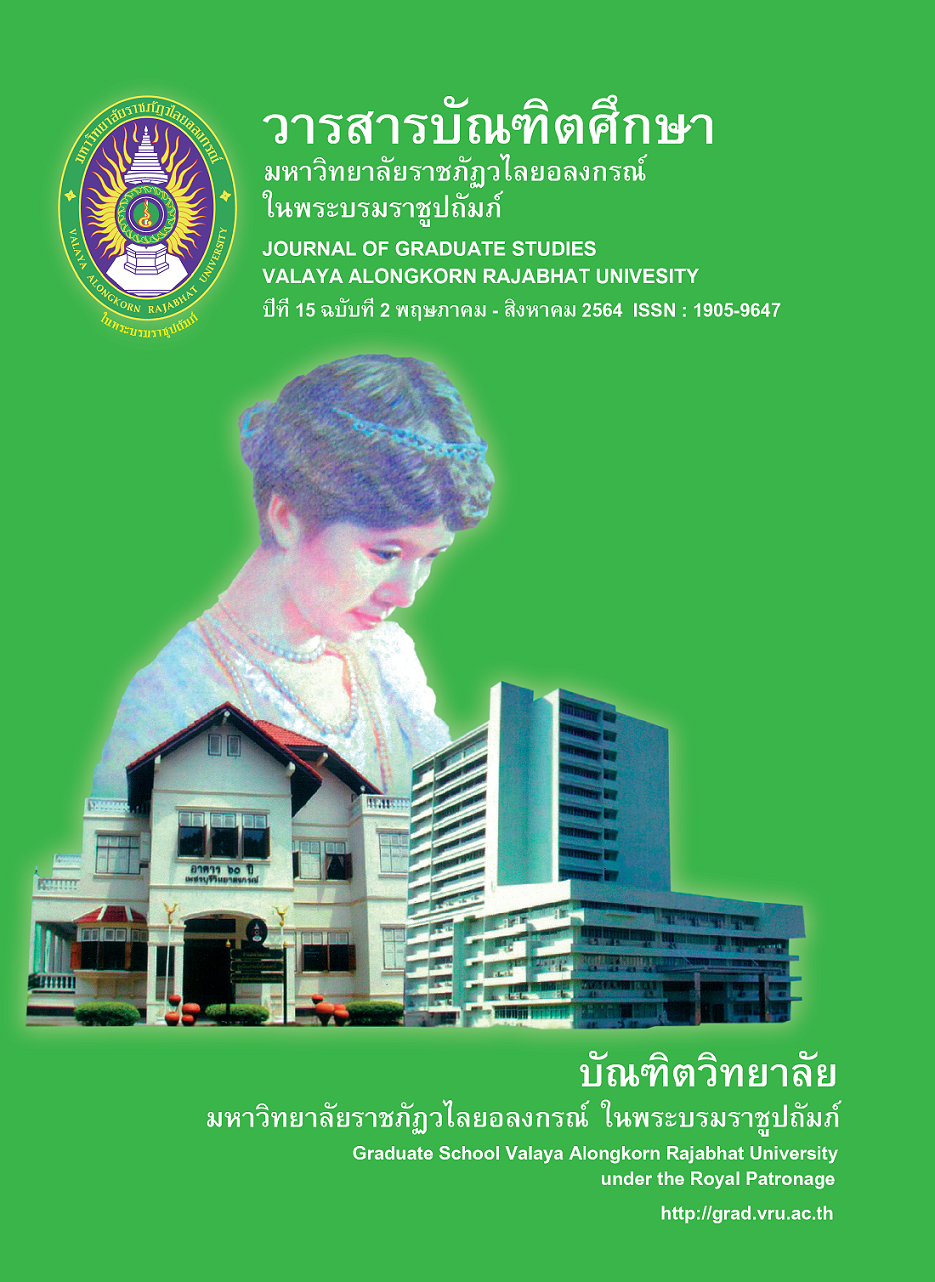UNPLUGGED LEARNING ACTIVITY TO DEVELOP COMPUTATIONAL THINKING SKILL IN THE SQUARE TOPIC FOR 5th GRADE STUDENTS
Main Article Content
Abstract
The purposes of this research were to study the guidelines for unplugged learning activities and to develop computational thinking skill of 5th grade students on the square topic. The research participants were 36 students in 5th grade in the second semester of 2019 academic year. The research instruments were four unplugged lesson plans which focus on developing computational thinking skill, observation form, worksheets and computational thinking skill interview form. The qualitative data were analyzed by content analysis and the quantitative data were analyzed by percentage. The results were as follows: 1. In the learning management of unplugged activities for developing computational thinking, the teacher should tell the students to consider about sub-condition of a whole problem, give an example of how to write the abstraction of the problem and an algorithm before they are writing it by themselves, give them enough time to deal with an activities in each steps. Moreover, the teacher should let the students to evaluate and check their problem solving before the presentation. 2.The students had developed computational thinking skill after using the learning management of unplugged activities. Most students had computational thinking skill at good level.
Article Details

This work is licensed under a Creative Commons Attribution-NonCommercial-NoDerivatives 4.0 International License.
บทความทุกเรื่องได้รับการตรวจความถูกต้องทางวิชาการโดยผู้ทรงคุณวุฒิ ทรรศนะและข้อคิดเห็นในบทความ Journal of Global of Perspectives in Humanities and Social Sciences (J-GPHSS) มิใช่เป็นทรรศนะและความคิดของผู้จัดทำจึงมิใช่ความรับผิดชอบของบัณฑิตวิทยาลัย มหาวิทยาลัยราชภัฏวไลยอลงกรณ์ ในพระบรมราชูปถัมภ์ กองบรรณาธิการไม่สงวนสิทธิ์การคัดลอก แต่ให้อ้างอิงแหล่งที่มา
References
Barcelos, T., Munoz, R., Villarroel, R., Merino, E., & Silveira, I. (2018). Mathematics Learning through Computational Thinking Activities: A Systematic Literature Review. Journal of Universal Computer Science. 24(7), 815-845. Retrieved from https://www.researchgate.net/publication/326894640_Mathematics_Learning_through_Computational_Thinking_Activities_A_Systematic_Literature_Review
Bell, T., Witten, I., & Fellows, M. (2015). CS Unplugged an enrichment and extension programme for primary-aged students. n.p.
Brackmann, C., et al. (2017). Development of Computational Thinking Skills through Unplugged Activities in Primary School. In The 12th Workshop on Primary and Secondary Computing Education (WiPSCE 2017). (pp. 65-72). Nijmegen, Netherlands: Institute for Computing and Information Sciences, Radboud University.
Faikhamta, C., Charoensuk, C., Srikarind, D., & Boriboon, P. (2016). kānwičhai patibatkān nai chan rīan witthayāsāt [Action Research in Science Classroom]. Bangkok: Academic Development Co.,Ltd.
Keereerat, C. (2019). kānchai krabūankān kǣ panhā læ prōkrǣm App Inventor phatthanā thaksa kān khit chœ̄ng khamnūan (Computational Thinking : CT) samrap phū rīan radap matthayommasưksā [Using the Problem-Solving and App Inventor to Develop Computational Thinking Skill for High School Students]. Journal of Education Studies Chulalongkorn University. 47(2), 31-47.
Kijkuakul, S. (2014). kānčhatkān rīanrū witthayāsāt thitthāng samrap khrū satawat thī yīsipʻet [Learning science Directions for teachers in the 21st century]. Phetchabun: Julladis printing.
Phanomtung, N., Erawan, P., & Boonchai, P. (2012). kānphatthanā thaksa thāng khanittasāt dōi chai nithān khanittasāt khō̜ng dek pathommawai rōngrīan ʻanubān Visit ʻamnūai sin čhangwat bưng kān: krabūankān wičhai patibatkān rūpbǣp wongčhō̜n lamdap wēlā [A Development of Mathematics Skills by Using the Mathematics Tales for Early children at Anuban Wisit Amnuaysin School, Bueng Kan : A Time Cycle Process Action Research]. Journal of Educational Measurement Mahasarakham University. 17(1), 201-209.
Saengloetuthai, J., & Maneerat, C. (2019). kānwičhai patibatkān nai chan rīan phư̄a phatthanākān rīan kānsō̜n [Classroom Action Research for Teaching Development]. Journal of Research and Curriculum Development. 9(2), 1-11.
Songkhram, C. (2019, June). kānwičhai chœ̄ng patibatkān phư̄a phatthanākān čhatkān rīanrū bǣp chai panhā pen thān thī songsœ̄m thaksa kān khit chœ̄ng khamnūan rư̄ang khwām nā čha pen khō̜ng nakrīan chan matthayommasưksā pī thī sī [The Development of Computational Thinking by using the Problem-Based Learning in Probability for Grade 10 students]. Master of Education. Naresuan University.
Srikamwiang, W. (2018). witthayākān khamnūan (Computing Science) [Computational Science (Computing Science)]. Retrieved from https://www.scimath.org /lesson-technology/item/8808-computing-science.
The institute for the Promotion of Teaching Science and Technology. (2017). khūmư̄ khrū rāiwichā phư̄nthān witthayāsāt theknōlōyī (witthayākān khamnūan) chan matthayommasưksā pī thī sī [Teacher Manual for Basic Science and Technology (Computational Science) Grade 10]. Bangkok: The institute for the Promotion of Teaching Science and Technology.
Tsarava, K., et al. (2017). Training Computational Thinking: Game-Based Unplugged and Plugged-in Activities in Primary School. In 11th European Conference on Game-Based Learning ECGBL 2017. (pp. 687-695). Graz, Austria: FH JOANNEUM University of Applied Sciences, Graz, Austria.


